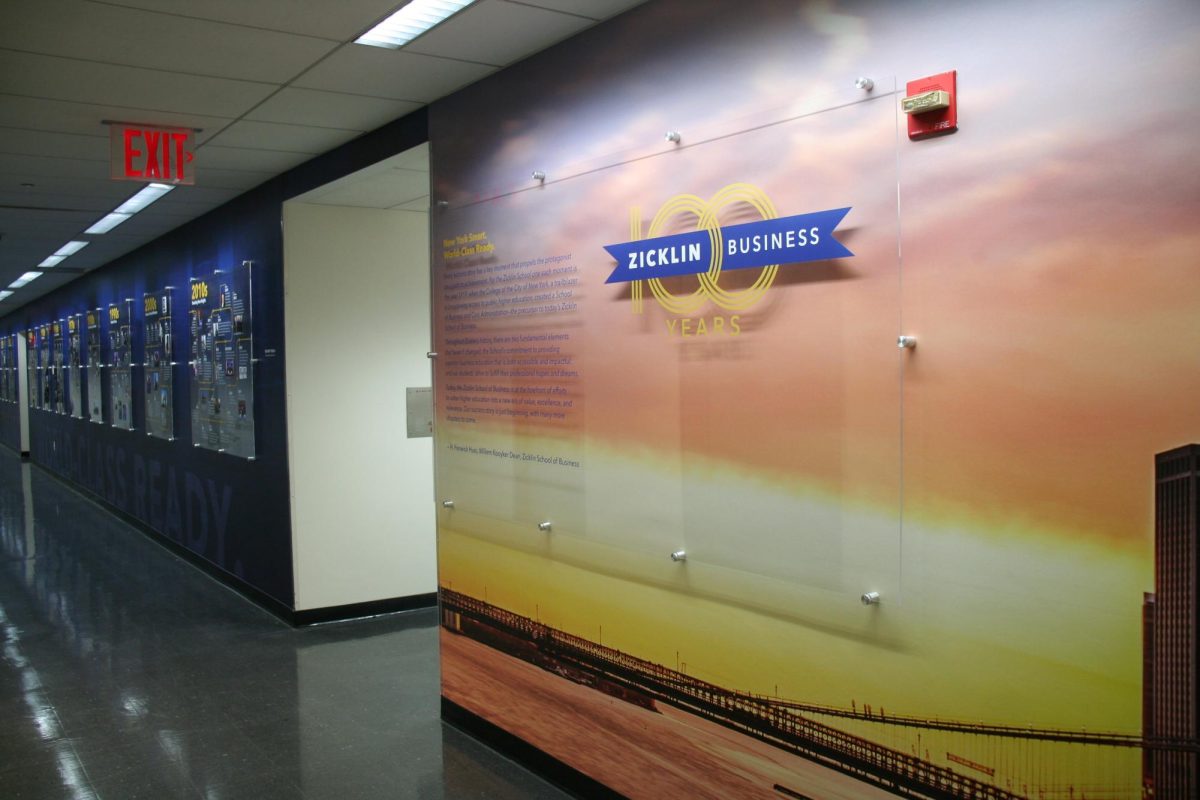The Zicklin School of Business’ new Willem Kooyker Dean, Bruce Weber, expressed his main goal for the fall 2023 semester was to explore Zicklin’s role in “Baruch 2028: Unstoppable” — the college’s five-year strategic plan — by putting together a strategic implementation committee.
In an interview with The Ticker, Weber elaborated on ideas for his first semester by introducing new initiatives and affirming the Zicklin School’s potential.
He discussed Baruch’s recent partnership with the New York Jobs CEO Council, brimmed with excitement over the future of AI in the classroom and encouraged business students to take a participatory approach to launch their careers.
Weber was appointed on March 9, officially beginning the role on July 17. He manages the Zicklin School’s operational and financial direction, whether building philanthropic connections — from which nearly 7% of Baruch’s budget flows — or collaborating with the Weissman School of Arts and Sciences and the Marxe School of Public and International Affairs.
But first and foremost for Weber was appraising and collectivizing the Zicklin School’s vision.
“It’s making sure that we’re all kind of working together in the same direction, that we’ve got a shared vision of what the Zicklin School does for its students, does for New York, does for companies that recruit our students,” he said.
Part of that will start with the strategic implementation committee will take Baruch’s strategic plan and come up with three to six “priority action items.”
“What I’d like us to do is agree on, what are we the most proud of within the Zicklin School?” he said. “What do we really think is an outstanding aspect of this school? And where do we think we could, with some effort, do better?”
The committee will begin meeting at the end of September.
Meanwhile, Weber has balanced familiarizing himself with the role’s responsibilities and implementing new programs.
One such area is CUNY’s work with the New York Jobs CEO Council, a group of city-based firms and organizations coordinating to hire more low-income New Yorkers.
Each of the “Big 4” accounting firms, Blackrock, Amazon, IBM, Google, TD Bank, The New York Times and many more members have all pledged to onboard 100,000 New Yorkers by 2030 — with 25,000 CUNY graduates hired so far.
With some of its 12 priority job areas being accounting, business analysis, data analysis, sales and business management, Baruch’s role is set to underpin the council’s success.
But in the classroom, while AI plunges the education world into quiet alarm, Weber quickly drew analogies from past disruptions that forced learning to evolve — as spreadsheets did.
He spoke on how large language models like OpenAI’s ChatGPT are getting better at analysis — generating reports on a company’s shortcomings and opportunities — and how generative AI can open the door to a more refined chance at solving implementation challenges students may face in the business world.
“Instead of the student going through that challenge of thinking through the basic raw information, coming up with a few recommendations — maybe the AI tool does that, and now the challenge for the student and the faculty member is, how do you implement that?” Weber said.
“Or what other considerations do we need to have, you know, beyond what we’ve gotten from the tool. So what I think a lot of faculty are going to be doing is thinking of AI not as a replacement for a student answering a series of questions or completing an assignment, but how do you augment the intelligence?”
When asked what he would be most proud to accomplish five years later, Weber indicated that the Zicklin School and Baruch plan to take advantage of newfound national recognition of its potential.
Secondary education rating agencies recently placed Baruch among the best for social mobility and value measures.
The Wall Street Journal’s annual ranking on Sept. 6 placed Baruch at No. 10 for best public colleges in the nation and said it was the top performer for its “best value” metric. In mid-August, the Princeton Review placed Baruch at No. 4 for a similar category, “Best Value Public Colleges.”
“It turns out when you add the Baruch opportunity, even to somebody who’s coming from an environment without any advantages, without any privileges, we put them in a position to compete with people who have had substantial advantages and privileges,” Weber said.
Weber discussed the trend of rating agencies focusing on “outputs” rather than “inputs” thatis seen Baruch’s quickening rise.
“I’m looking forward to the next five years being a time where we sort of solidify this unique distinguishing position… as a school that can bring an 18-year-old from a background without a lot of professional role models around them to getting a professional job at age 22, putting them on track for a CFO or a CEO position and to be doing business internationally and all across the U.S.” he said.









